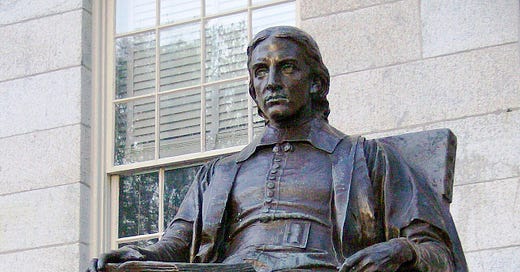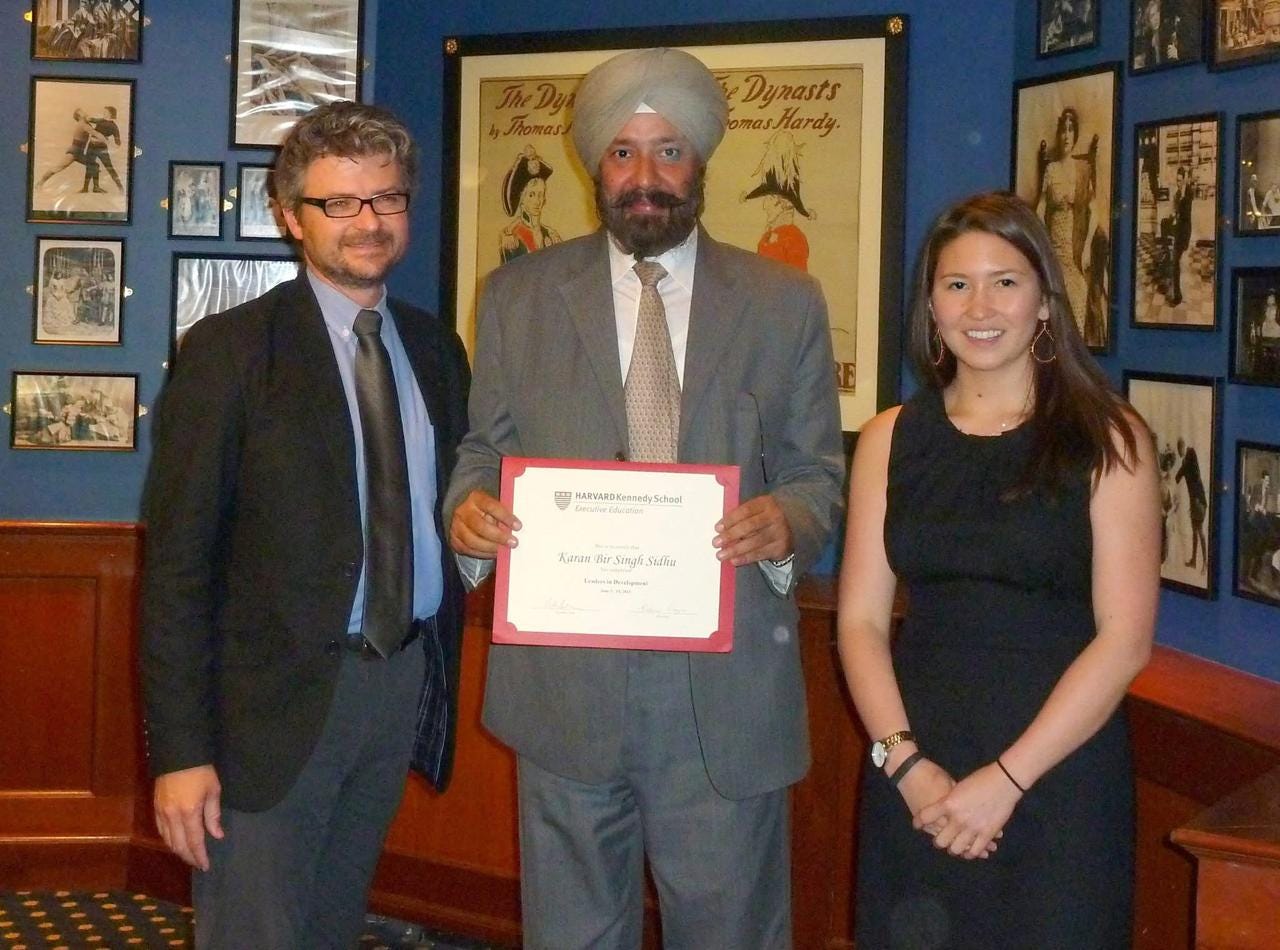Is Harvard Now Declared Persona Non Grata by Trump?
The outcome of this conflict will decide whether American universities remain independent centers of inquiry or become tools of political control.
Is Harvard Now Declared Persona Non Grata by Trump?
The escalating conflict between the Trump administration and Harvard University has reached unprecedented levels, raising fundamental questions about the relationship between federal government power and academic independence in the United States. What began as demands for campus reforms has evolved into a comprehensive assault on one of America's most prestigious institutions, involving funding freezes, enrollment bans, and threats to tax-exempt status. The administration's actions suggest that Harvard has indeed been declared persona non grata, marking a dramatic shift in federal-university relations that could reshape the future of American higher education but, more importantly of freedom of thought and expression.
The Foreign Student Enrollment Ban: A Nuclear Option
Revocation of International Student Privileges
On May 23, 2025, the Department of Homeland Security delivered what many consider the most devastating blow to Harvard's operations by revoking the university's ability to enroll international students. This unprecedented action affects nearly 6,800 foreign students currently enrolled at Harvard's Cambridge campus, representing more than a quarter of the university's total student body. The revocation of Harvard's certification in the Student and Exchange Visitor Program means these students must either transfer to other institutions or face the loss of their legal status in the United States.
The timing and scope of this action underscore the administration's willingness to weaponize immigration policy against academic institutions. DHS Secretary Kristi Noem justified the measure by claiming Harvard had created an unsafe campus environment, allowing "anti-American, pro-terrorist agitators" to assault Jewish students. The administration also accused Harvard of coordinating with the Chinese Communist Party, alleging the university hosted and trained members of a Chinese paramilitary group as recently as 2024.
Global Implications and International Response
The international ramifications of this decision extend far beyond Harvard's campus boundaries. Chinese officials have characterized the move as damaging to America's international standing, with state broadcaster CCTV questioning whether the United States would now remain a top destination for foreign students. The Chinese Foreign Ministry spokesperson accentuated that educational cooperation should remain mutually beneficial and opposed its politicization, reflecting broader concerns about the deteriorating relationship between the world's two largest economies.
The decision has created immediate uncertainty for prospective international students, with at least one university in Hong Kong promising to accept displaced applicants. This brain drain could have long-term consequences for American competitiveness in science and technology, as international students have historically contributed significantly to innovation and research breakthroughs in the United States.
Disproportionate Impact on Indian Students
The Trump administration’s revocation of SEVP accreditation has plunged 788 Indian students into immediate crisis, forcing mid-program transfers out of Harvard’s specialized courses, even though peer institutions offer only narrow transfer windows. Prospective students who spent years tailoring their profiles to Harvard’s holistic admissions criteria now face dashed aspirations; many are scrambling for alternatives in Canada or Europe while losing access to Harvard’s elite biotech and policy networks. India’s $9 billion annual contribution to the U.S. economy through student spending now risks turning into a strategic brain drain, endangering the U.S.–India innovation pipeline in AI and vaccine research. Individual cases such as Shreya Mishra Reddy—whose family invested more than ₹75 lakh a year in her executive leadership program—illustrate the cascading losses: terminated OPT work authorizations hinder loan repayment, and forced transfers invalidate post-graduate employment visas.
Financial Warfare: The $2.2 Billion Freeze
Unprecedented Funding Cuts
The financial dimensions of the Trump administration's campaign against Harvard reveal the scope of federal leverage over higher education institutions. In April 2025, the administration froze $2.2 billion in grants and $60 million in contracts to Harvard University, representing one of the largest federal funding cuts ever imposed on a single academic institution. This freeze followed Harvard's rejection of sweeping demands for governance reforms, admissions policy changes, and restrictions on campus activism.
The funding freeze has particularly severe implications for Harvard T.H. Chan School of Public Health, where approximately 46% of the total budget comes from federal funding for direct research costs and facilities administration. The suspension has forced researchers like tuberculosis specialist Sarah Fortune to halt their work, potentially affecting medical breakthroughs that could save lives globally. The administration's willingness to sacrifice scientific research for political objectives demonstrates the extent to which Harvard has been deemed expendable.
Impact on Research and Innovation
The financial assault on Harvard represents more than an attack on a single institution; it threatens the broader ecosystem of American scientific research and innovation. Harvard's research programs span critical areas from aging and the microbiome to workplace well-being, with implications for national security, public health, and economic competitiveness. The university's partnerships with federal agencies have historically powered discoveries that have saved tens of millions of lives worldwide, making the funding freeze a significant blow to American leadership in global innovation.
The administration's approach raises serious questions about the future of federal research funding and its potential politicization. If universities can lose billions in research funding based on political disagreements rather than scientific merit, the independence and effectiveness of American research institutions may be fundamentally compromised.
Tax-Exempt Status Under Threat
The Ultimate Financial Weapon
President Trump's threat to revoke Harvard's tax-exempt status represents perhaps the most severe financial weapon in the federal government's arsenal against the university. In May 2025, Trump announced on Truth Social that his administration would be "taking away Harvard's Tax Exempt Status," describing it as what the institution deserves. This designation as a 501(c)(3) organization exempts Harvard from paying federal income taxes and makes donations to the university tax-deductible for contributors.
The loss of tax-exempt status could cost Harvard millions of dollars annually and significantly impact its ability to raise funds from donors. With an endowment valued at $53 billion, Harvard's financial resources are substantial, but the psychological and practical effects of losing tax exemption would be profound. The move would also set a dangerous precedent for other universities that might face similar threats for political non-compliance.
Legal and Constitutional Challenges
Harvard President Alan Garber has expressed serious doubts about the legality of revoking the university's tax-exempt status, calling such an action "highly illegal" absent compelling justification. The tax code specifically prohibits executive branch officials from requesting IRS employees to conduct or terminate audits or investigations of specific taxpayers, raising questions about the constitutional separation of powers and the independence of tax administration.
The threat to tax-exempt status exemplifies the administration's willingness to blur traditional boundaries between political pressure and legal authority. Universities have historically received tax exemptions to support their educational missions, enabling more resources to flow toward scholarships, research, and technological advancement that drives economic growth.
Harvard's Legal Counteroffensive
Multiple Lawsuits and Constitutional Arguments
Harvard's response to the Trump administration's multipronged assault has been equally comprehensive, involving multiple lawsuits challenging different aspects of federal action. The university has filed separate legal challenges to the funding freeze and the international student enrollment ban, arguing that both actions violate First Amendment rights and constitute unconstitutional retaliation for exercising academic freedom.
In its lawsuit challenging the student enrollment ban, Harvard argued that the government was attempting to "erase a quarter of Harvard's student body" with "the stroke of a pen." The University characterized the action as clear retaliation for exercising First Amendment rights to reject government demands for control over governance, curriculum, and faculty ideology. These legal arguments frame the conflict as a fundamental constitutional battle over the limits of federal power and the protection of academic independence.
Institutional Support and Free Speech Concerns
Harvard's legal battles have garnered support from various educational and civil liberties organizations, including the American Council on Education and the Foundation for Individual Rights and Expression. These groups have characterized the administration's demands as creating a "surveillance state" and representing "textbook authoritarianism" that threatens the foundations of academic freedom.
The involvement of free speech organizations highlights broader concerns about the precedent being set through the Harvard case. If the federal government can successfully coerce universities through funding threats and administrative sanctions, the independence of all higher education institutions may be at risk, potentially transforming universities into instruments of political control rather than centers of independent inquiry and learning.
Broader Implications for Higher Education
Setting Dangerous Precedents
The Trump administration's treatment of Harvard establishes troubling precedents for federal-university relations across the country. DHS Secretary Kristi Noem explicitly warned that similar steps could be taken against other universities that fail to cooperate with federal demands, suggesting that Harvard's treatment is intended as a cautionary example rather than an isolated incident.
The administration's willingness to use immigration policy, research funding, and tax policy as weapons against academic institutions represents a significant expansion of federal power over higher education. This multifaceted approach creates multiple pressure points that could be applied to any university that resists political demands, potentially transforming the landscape of American higher education from one of relative independence to one of federal control.
International Competitiveness and Brain Drain
The international implications of the Harvard case extend beyond symbolic politics to practical concerns about American competitiveness in the global knowledge economy. The United States has historically attracted the world's brightest students and researchers, many of whom have contributed to American innovation and economic growth after completing their education.
The administration's actions risk accelerating a brain drain that could benefit competing nations, particularly China, which already offers alternative destinations for international students. As Chinese officials and universities capitalize on American restrictions by welcoming displaced students, the long-term consequences for American leadership in science, technology, and innovation become increasingly apparent.
Summing Up
The Trump administration's comprehensive assault on Harvard University through enrollment bans, funding freezes, and threats to tax-exempt status suggests that the institution has been declared persona non grata for all intents and purposes. This unprecedented use of federal power against a single university represents more than a political dispute; it constitutes a fundamental challenge to the principles of academic freedom and institutional independence that have historically defined American higher education.
The Harvard case serves as a crucial test of the boundaries between federal authority and university autonomy, with implications extending far beyond a single institution. The administration's willingness to sacrifice scientific research, international cooperation, and educational excellence for political objectives raises serious questions about the future of American higher education and its role in maintaining the nation's competitive advantage in the global knowledge economy.
As legal battles continue and international students face uncertainty about their academic futures, the Harvard controversy illuminates the fragile nature of institutional independence in an era of increasing political polarization. The ultimate resolution of this conflict will likely determine whether American universities can maintain their traditional role as centers of independent inquiry or whether they will be transformed into instruments of political control, fundamentally altering the landscape of higher education for generations to come.
STOP PRESS
US District Judge Allison D. Burroughs, based in Boston, Massachusetts, issued the temporary restraining order blocking the Trump administration’s ban on Harvard enrolling international students. In her ruling, Judge Burroughs stated the move would cause “immediate and irreparable injury” to the university and highlighted the sudden confusion and disruption the ban created for thousands of students and academic programs. Harvard’s lawsuit argued that the government’s action was “clear retaliation” for the university’s refusal to comply with politically motivated demands, and Burroughs agreed that Harvard had shown it could be harmed before there was an opportunity to fully hear the case.





